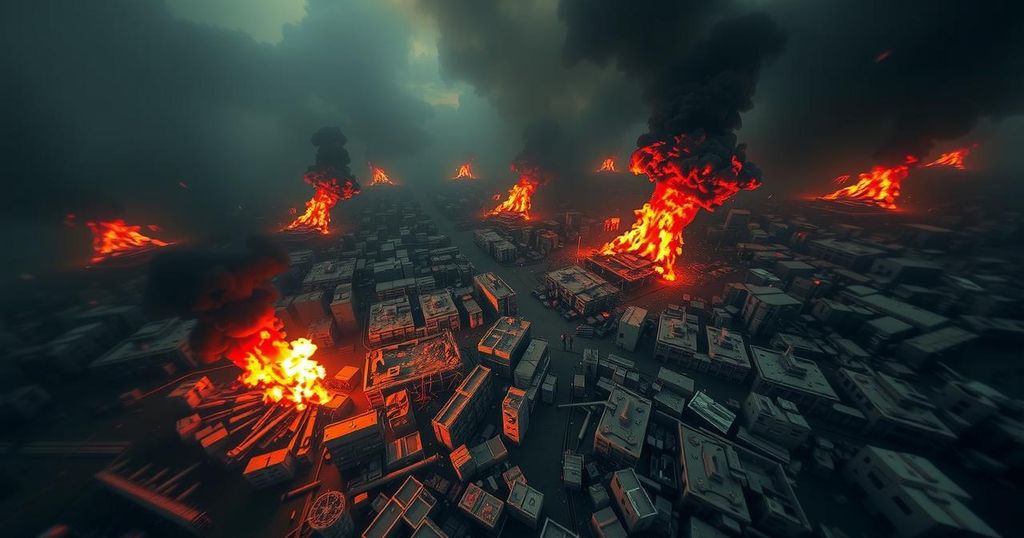Syria’s civil war has refocused global attention after insurgents seized control of Aleppo and adjacent territories. The escalating conflict marks the heaviest fighting since a 2020 ceasefire, with Russian and Syrian forces launching airstrikes against the advancing opposition. Key players include pro-government forces, Turkish-backed rebels, and U.S.-supported Kurdish factions, each complicating the landscape of an already entangled conflict.
Syria’s protracted civil war has resurfaced on the global stage following a significant offensive by opposition insurgents, who have gained control over much of Aleppo and surrounding areas. This unexpected resurgence comes amidst a backdrop of weakened and distracted key players, marking the most intense fighting since a negotiated ceasefire in 2020. Russian and Syrian military forces have responded with substantial airstrikes aimed at thwarting the insurgents’ advances, resulting in heavy casualties on both sides.
Since commencing in 2011, Syria’s conflict arose from public discontent with President Bashar Assad’s rule. A complex web of foreign powers, including Russia, Iran, and the United States, now exerts military influence within Syria. Opposition factions, alongside U.S.-supported forces, control over one-third of the territory, while Israel maintains its grip on the Golan Heights, captured during the 1967 war.
Key players in this ongoing conflict include the Syrian government forces bolstered by Russian and Iranian support, which have long dominated significant urban centers in Syria. Recent insurgent successes in Aleppo represent a severe setback for Assad’s regime, despite the regime’s prior resurgence following the fall of Aleppo to government control in late 2016. The Iranian military presence remains crucial, yet it has been diminished by its engagement in conflicts with Israel, with additional Iraqi militia support now entering Syria.
Opposition is primarily led by Hayat Tahrir al-Sham (HTS), a group with historical ties to al-Qaida. HTS commands substantial territory in northwest Syria, where it also administers local governance. Other Turkish-backed factions, including the Syrian National Army, are active in various combat zones, particularly against U.S.-aligned Kurdish forces in northern Syria.
Meanwhile, the Kurdish-led Syrian Democratic Forces (SDF), with American backing, hold significant portions of eastern Syria, tasked primarily with combating the remnants of the Islamic State. Approximately 900 U.S. troops remain stationed in Syria to deter extremist regrouping, amid a complex interplay of regional dynamics and conflicting military interests. The ongoing situation continues to evolve, as Turkish actions against Kurdish factions further escalate tensions in the region.
The Syrian civil war began in 2011 following an uprising against President Bashar Assad, which has since evolved into a multifaceted conflict involving multiple foreign powers and various domestic factions. As the war persists, key players such as the U.S., Russia, Iran, and Turkey maintain military presences in Syria, each pursuing divergent interests that complicate resolution efforts. The capture of Aleppo by insurgents marks a critical shift in the power dynamics within the region, reigniting interest and concern among the international community. The involvement of various militant groups, coupled with the impact of foreign military engagements, continues to shape the course of this protracted conflict.
The recent gains by opposition insurgents in Aleppo have rekindled international focus on Syria’s ongoing civil war, reflecting a shift in military dominance. As Syrian government forces, supported by Russian and Iranian military operations, attempt to regain control, the battlefield remains volatile with potential escalations. Meanwhile, the roles of international actors and regional groups illustrate the deep complexities and interwoven interests that continue to drive the conflict and hinder potential resolutions.
Original Source: mynorthwest.com






